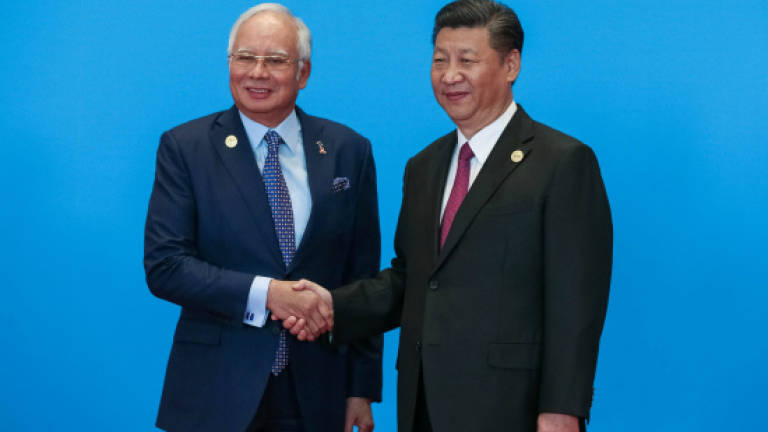Najib confident Malaysia will receive enormous benefit from China's Obor initiative

KUALA LUMPUR: Prime Minister Datuk Seri Najib Abdul Razak has repeated his confidence that Malaysia will receive enormous benefit from China's One Belt One Road (Obor) initiative.
He said this was due to the existence of interconnection, especially between China and Central Asia, China and Europe, China and Southeast Asia, as well as between China and East Africa.
"Just imagine (the benefit of) the Belt and Road network, which is a large-scale and comprehensive. It will definitely give a boost to the development of various sectors and industries, hence generate bigger growth through good infrastructure as the catalyst," he said in his latest blog post at www.najibrazak.com here today.
Najib said through the initiative, transportation and movement of goods would be much easier and cheaper and would also enable local entrepreneurs to penetrate a larger market.
"Insya-Allah (God willing), with the concept of shared prosperity and win-win situation, I believe Malaysia, as well as other countries, will be able to realise its potential under the One Belt, One Road initiative," he said.
Obor initiative was mooted by President Xi Jinping of China as a development strategy that focuses on connectivity and cooperation among countries. It is also to boost trade between the countries by providing infrastructure such as ports, railways and expressways.
In the blog posting, Najib also summed up the success of his five-day visit to China, which began last Friday, including the signing of nine Business-to-Business Memoranda of Understanding in various sectors, including construction, agriculture, financial market, infrastructure and investment cooperation worth US$22.7 billion (RM31.26 billion).
He said most of the projects would be implemented in Malaysia, including the Robotic Future City on a 1,000 acres (404.6ha) site in Johor Baru, which involves an investment of more than RM15 billion and would include a holistic development in terms of research and development, manufacturing, education, services, and exhibition centre.
"Sabah and Sarawak have also benefited from this visit. In Sarawak, a joint-venture factory producing methanol and derivatives between Sarawak Bumiputera Property Foundation, Consortium of Huanhqiu Contracting & Engineering Co. and MACFEAM Sdn Bhd will be built at a cost of RM2 billion and is estimated to be completed in 2021.
"In Sabah, a cooperation agreement to develop The Shore worth US$132.58 million has also been signed," he said.
Najib said the AirAsia had also become the first low-cost carrier outside China which had been granted a licence to operate in the republic with an investment of US$100 million.
He said Prime Minister Li Keqiang had given assurance that the China's government would continue supporting Chinese companies to invest in Malaysia.
"Foreign investments such as this will certainly help our people as it would create higher-income and highly-skilled job opportunities.This is in line with our aspiration become a high income nation by 2020," he said.
In terms of bilateral relations, Najib said President Xi had said that the Malaysia-China relation was currently at its best in history and that he appreciated Malaysia's support for the Obor initiative.
Malaysia has also benefited directly from it, such as in the financing of the construction of the East Coast Rail Line (ECRL) by the Exim Bank of China, he said.
"I also noted that China has increased its palm oil purchase from Malaysia upon my request during the visit last November. The government expects palm oil exports to China will rise much higher with the signing of the Memorandum of Understanding (MoU) between Felda Global Ventures Holdings Bhd and Sinograin Oils Corp.
"This agreement will also provide access to midstream and downstream markets in China. I believe that more Malaysian companies will receive the benefits of the good relations between Malaysia and China's top leadership," he explained.
Meanwhile, the development of the Digital Free Trade Zone was also very encouraging with the signing of the MoU between Malaysia Digital Economy Corporation, Hangzhou Municipal Government and Alibaba (China) Company Limited.
Najib said he was confident that Malaysia would be able to develop the e-commerce industry through the initiative in which Malaysia would become the hub of digital economy in Southeast Asia with an estimated double-digit growth, while Hangzhou to become the hub in China, which is a good news for operators of small- and medium-scale entrepreneurs in the country. — Bernama